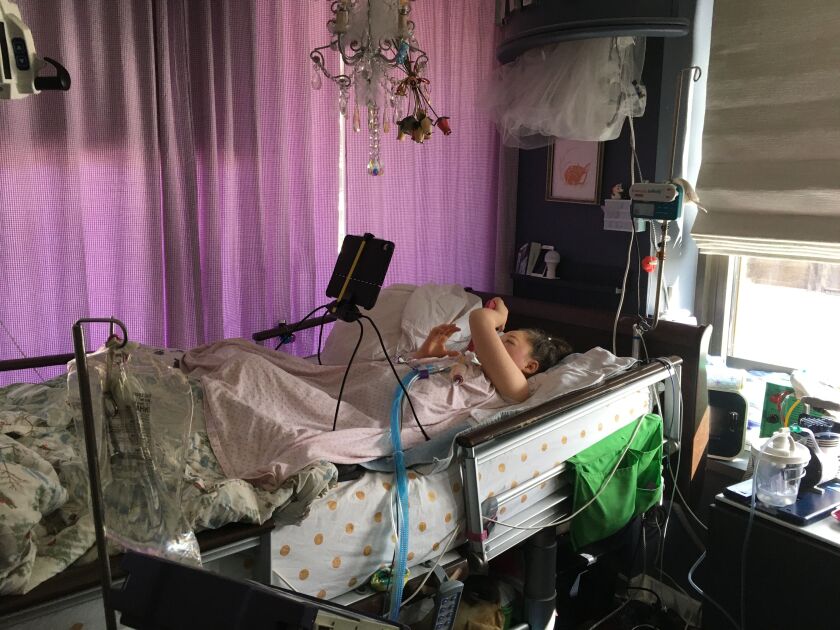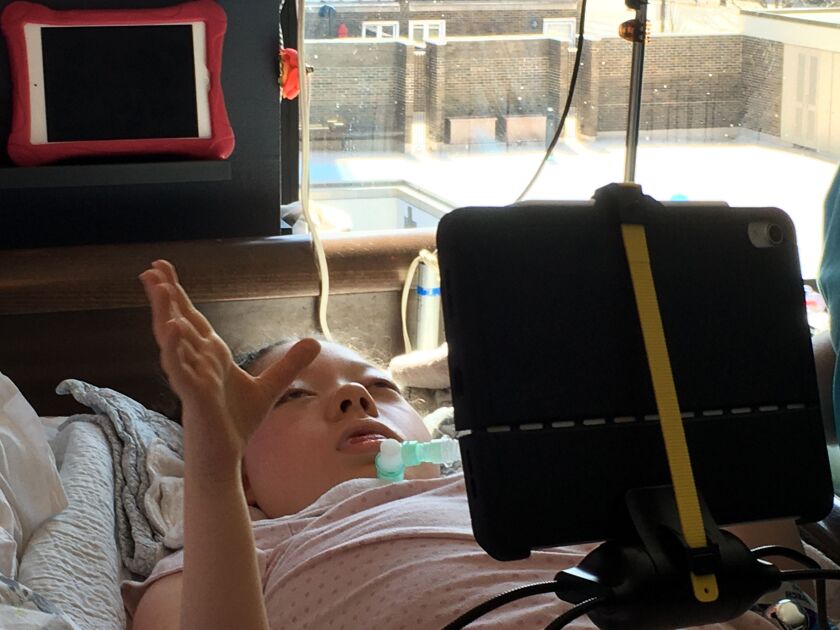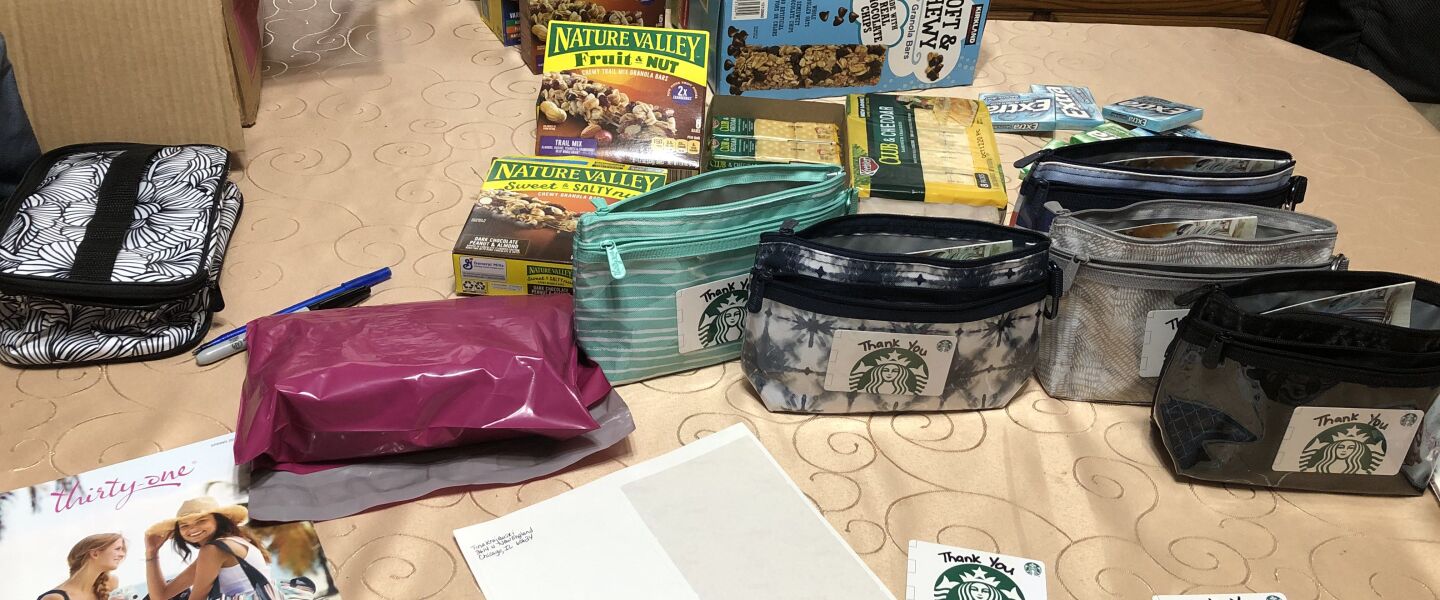Emma is prone to seizures and medically fragile. She needs machines just to eat, communicate and breathe at night.
What’s a sniffle for someone else can be a serious illness for her. So her mom, dad and sister are experts in the germ-killing practices now seen as essential in staving off the rapidly spreading novel coronavirus.
In their family, hands have always gotten washed and washed, classes have been missed and schoolwork done at home and routine appointments pushed off until after the danger has passed.
Now, packages sit in the basement for a day, the nurses who help care for Emma don masks, and all other visitors have been banned from their Norwood Park home — including those who help with therapy.
In the face of the spreading global pandemic, others are getting a small taste of what life normally is like in homes like Emma’s.
“I don’t wish that on anybody,” Emma’s mother Christina Fedor says, “to realize how fragile people are. I just hope we can get through this without an ICU admission.”
Even if Emma needed a hospital for something besides coronavirus, her doctor has warned she’d almost certainly catch it there.
If her parents became infected with COVID-19, who could provide so much care for their daughter?
With hospitals no longer allowing visitors, would Mom or Dad be able to stay with Emma, who can’t speak, if she needed to be admitted?
“So my priorities about this are completely different from the vast majority of people concerned their kids are missing school,” Fedor says.
Emma and other severely medically needy kids, like her fellow Chicago Public Schools student Letty Young, were pulled out of school even before Gov. J.B. Pritzker canceled classes statewide.
Emma’s classroom at Farnsworth Elementary “has a lot of kids with special needs who aren’t developmentally able to cover coughs or sneezes, so we pulled her out for that reason,” her mom says. “We’re just focused on surviving at this point.”
Letty, 12, uses a ventilator to breathe because of a severe muscular disorder. She can type with a finger.
“We’re used to complications, used to hygiene and making sure things are sanitary, also used to spending a lot of time at home,” her mom Myra Young says. “This is what we were made for.
“We go into isolation mode most winters just not to this extreme. We’re also used to having a plan for everything.”
Myra Young has learned to tend to a slew of medical problems, to bump up respiratory treatments from every four hours to every two to keep Letty’s breathing strong, to thin her mucus the times she’s had pneumonia.
If Letty’s bones break, as they have in the past, Mom can even splint them herself until she can get an appointment to see the orthopedic doctor at his office and avoid the emergency room.
The family also has another doctor lined up to visit Letty at their apartment if she needs more care.
“I don’t know if it’s naive to think we know how to handle it,” Myra Young says. “My daughter’s already on a ventilator and getting assistance. She’s living on life support. Thriving on life support, we say.”
Since the pandemic reached Chicago, her parents and older brother not only remove their shoes and wash their hands when they come back from the store, they also take full showers.
Typically, about a dozen people move in and out of their home every week to assist in Letty’s care. For now, all but a few trusted nurses have been told to stay away. Her therapists work at Lurie Children’s Hospital, and her parents don’t want to risk any possible contamination.
Luckily, those sessions were able to be shifted online, so Letty doesn’t lose too much ground with speech and physical therapies.
Ally Krajewski, 14, gets therapy only at school. So, as long as CPS is off, she is, too. Diagnosed as a baby with the most severe form of spinal muscular atrophy, which often cuts children’s lives short, Ally lives on a ventilator. She also uses a machine to cough, a stomach tube for feeding and eye-gaze devices to communicate.
Ally’s occupational and physical therapists at Coonley Elementary have sent her parents long emails filled with ideas about things to practice at home. But someone has to help her.
Her dad is still working, delivering supplies from a warehouse to construction sites, a job deemed essential as the rest of the state shuts down through the end of the month, a job whose income the family relies on.
Her mom Tina Krajewski was once a CPS teacher and more recently a regular substitute. She’s been trying to keep the family of five together, caring for Ally, worrying about her two older daughters, and trying to track down elusive supplies the family has always depended on that recently have been snapped up: gloves and masks and hand sanitizer.
“The rest of the world buying up the soap and the masks is kind of crazy,” she says.
Both of Ally’s home nurses are out sick and won’t be able to help until who knows when. “One was tested for COVID-19 but only has some symptoms,” her mom says. “The other has not been tested but has more symptoms.”
It didn’t take long at home for Ally’s days and nights to get mixed up.
“She’s just totally out of routine,” Tina Krajewski says. “She’s watching her movies and stuff in her room. Her sleep patterns are off because she’s sleeping a lot during the day. It’s horrible.”
Ally has always gone to school, even in the wintertime.
“We’ve always taken the attitude that Ally’s here and should live life to the fullest,” her mom says.
The teenager had a crucial treatment right before school closed. That tends to keep her healthier. Her mom says she had two bad viruses, H1N1 and RSV, as a younger child.
“I’m trying to lean on faith that the studies in other countries, truly children, even medically complex children, the majority of them aren’t being affected severely,” Tina Krajewski says.
There’s no danger of Ally wanting for a ventilator since the family owns one. “So if we went to the hospital, a medical support group I’m in said, ‘Bring all of your own machines,’ ” her mom says.
Ally is learning to drive her wheelchair with her wrists and an ear but hasn’t come out of her room much since school closed. Eighth grade rites of passage are all cancelled, worst of all the Washington, D.C., trip she had looked forward to. She has only been able to join one video chat with her friends from school.
“Right now,” her mom says, “she’s not doing much of it because I have not been able to sit and do it.”
Since each of these girls needs someone to be with them most of the time to do their work — at school, that’s a job performed by an aide — schoolwork is an extra effort for all three families.
“It’s definitely hard,” Myra Young says. “She needs a one-on-one [aide] with her. We’re just doing the best she can.”
What CPS has sent home for students with special needs has been uneven citywide, as school administrators scrambled to roll out take-home meals and e-learning plans for the school system’s 360,000 students. Eventually, all of CPS’ kids who need this level of help could fall behind academically, too.
“Our kids still need to learn, too, and they can’t at this time at the same level,” Tina Krajewski says. “If we go in this direction for a long time, and I anticipate we will, we need to make sure we’re supporting them. Luckily, I’m a teacher. But we can’t do it at the level that their special ed teachers can do and their therapists at school.”
Emma and Ally miss their social lives at school, their friends, their routines.
Letty doesn’t mind being home from Ogden International so much. She’s joined a family book club of “Wuthering Heights” and is doing art and watching videos sent by her teachers. And therapy takes a few hours of her day.
“We’ve always put her health ahead of everything else,” Myra Young says. “Education is so important. Just existing is even more important than that.”










